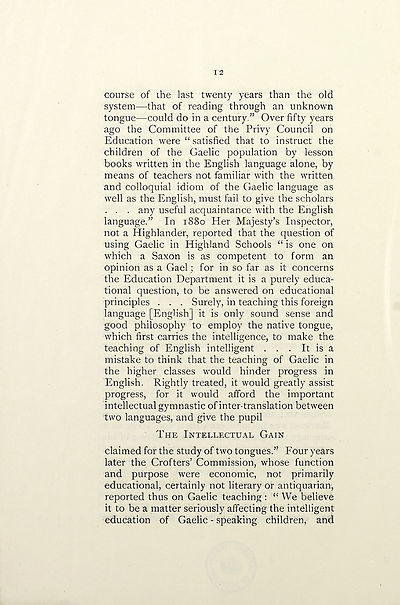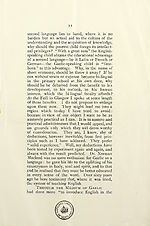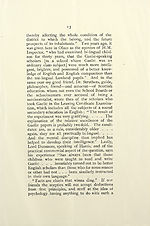Download files
Complete book:
Individual page:
Thumbnail gallery: Grid view | List view

12
course of the last twenty years than the old
system—that of reading through an unknown
tongue—could do in a century.” Over fifty years
ago the Committee of the Privy Council on
Education were “ satisfied that to instruct the
children of the Gaelic population by lesson
books written in the English language alone, by
means of teachers not familiar with the written
and colloquial idiom of the Gaelic language as
well as the English, must fail to give the scholars
. . . any useful acquaintance with the English
language.” In 1880 Her Majesty’s Inspector,
not a Highlander, reported that the question of
using Gaelic in Highland Schools “ is one on
which a Saxon is as competent to form an
opinion as a Gael; for in so far as it concerns
the Education Department it is a purely educa¬
tional question, to be answered on educational
principles . . . Surely, in teaching this foreign
language [English] it is only sound sense and
good philosophy to employ the native tongue,
which first carries the intelligence, to make the
teaching of English intelligent . . . It is a
mistake to think that the teaching of Gaelic in
the higher classes would hinder progress in
English. Rightly treated, it would greatly assist
progress, for it would afford the important
intellectual gymnastic of inter-translation between
two languages, and give the pupil
The Intellectual Gain
claimed for the study of two tongues.’’ Four years
later the Crofters’ Commission, whose function
and purpose were economic, not primarily
educational, certainly not literary or antiquarian,
reported thus on Gaelic teaching: “We believe
it to be a matter seriously affecting the intelligent
education of Gaelic - speaking children, and
course of the last twenty years than the old
system—that of reading through an unknown
tongue—could do in a century.” Over fifty years
ago the Committee of the Privy Council on
Education were “ satisfied that to instruct the
children of the Gaelic population by lesson
books written in the English language alone, by
means of teachers not familiar with the written
and colloquial idiom of the Gaelic language as
well as the English, must fail to give the scholars
. . . any useful acquaintance with the English
language.” In 1880 Her Majesty’s Inspector,
not a Highlander, reported that the question of
using Gaelic in Highland Schools “ is one on
which a Saxon is as competent to form an
opinion as a Gael; for in so far as it concerns
the Education Department it is a purely educa¬
tional question, to be answered on educational
principles . . . Surely, in teaching this foreign
language [English] it is only sound sense and
good philosophy to employ the native tongue,
which first carries the intelligence, to make the
teaching of English intelligent . . . It is a
mistake to think that the teaching of Gaelic in
the higher classes would hinder progress in
English. Rightly treated, it would greatly assist
progress, for it would afford the important
intellectual gymnastic of inter-translation between
two languages, and give the pupil
The Intellectual Gain
claimed for the study of two tongues.’’ Four years
later the Crofters’ Commission, whose function
and purpose were economic, not primarily
educational, certainly not literary or antiquarian,
reported thus on Gaelic teaching: “We believe
it to be a matter seriously affecting the intelligent
education of Gaelic - speaking children, and
Set display mode to:
![]() Universal Viewer |
Universal Viewer | ![]() Mirador |
Large image | Transcription
Mirador |
Large image | Transcription
| An Comunn Gàidhealach > An Comunn Gàidhealach Publications > Gaelic in the Highland schools > (12) |
|---|
| Permanent URL | https://digital.nls.uk/122769715 |
|---|
| Description | This contains items published by An Comunn, which are not specifically Mòd-related. It includes journals, annual reports and corporate documents, policy statements, educational resources and published plays and literature. It is arranged alphabetically by title. |
|---|
| Description | A collection of over 400 items published by An Comunn Gàidhealach, the organisation which promotes Gaelic language and culture and organises the Royal National Mòd. Dating from 1891 up to the present day, the collection includes journals and newspapers, annual reports, educational materials, national Mòd programmes, published Mòd literature and music. |
|---|---|
| Additional NLS resources: |
|

